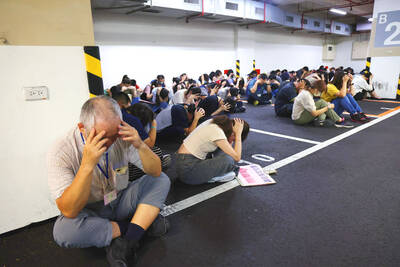New research has shed some light on the development of the human brain, scientists said yesterday.
While the mechanism by which human brain size is determined is still relatively unknown, a study of gene abnormality in primary microcephaly (MCPH) patients has revealed how cell organelle centrioles may affect the thickness of the cerebral cortex, said Tang Tang (唐堂), a Research Fellow at Academia Sinica’s Institute of Biomedical Sciences.
“MCPH patients are characterized by a head circumference that is three standard deviations smaller than the norm,” Tang told a press conference at the National Science Council yesterday.
In addition to having a substantially smaller cerebral cortex and central nervous system than healthy individuals, “in most cases, MCPH patients also have mild to severe mental retardation,” Tang said.
Though the exact reason people develop MCPH is unknown, so far a total of seven genes have been found to lead to MCPH. Four of them, named MCPH1, MCPH3, MCPH5 and MCPH6 [called centrosomal P4.1-associated protein (CPAP), a gene discovered by Tang’s lab in 2000], have been singled out already, Tang said.
Of the four workable genes the researchers have found, three (MCPH3, 5, and 6) are located on the centriole, he said.
“In higher order animals, cell division includes DNA duplication as well as centriole duplication, but so far little is known about the latter,” Tang said.
What is known now is that centrioles assist the centrosomal protein recruiting process and in turn help promote the cell mitosis [cell division] process, he said.
In their study on MCPH patients, Tang’s team identified a mechanism in which centriole duplication is governed by CPAP, Tang said.
“[Our lab] discovered CPAP in 2000 and in 2005 another group of researchers found mutation of the gene leads to MCPH,” Tang said.
“In our new research, we found that insufficient CPAP protein levels in cells inhibited the duplication of the centrioles during neurogenic mitosis and in turn we deduce that the phenomenon causes a reduced number in the afflicted individual’s brain cells,” he said.
In other words, by having depleted CPAP proteins, people have smaller brains.
The team’s finding was published in this month’s edition of Nature Cell Biology.
While clinically almost all MCPH cases caused by CPAP abnormality demonstrate a CPAP deficiency, Tang’s team discovered that an excess level of CPAP in the cells also cause centriole replication to be abnormal.

Taipei on Thursday held urban resilience air raid drills, with residents in one of the exercises’ three “key verification zones” reporting little to no difference compared with previous years, despite government pledges of stricter enforcement. Formerly known as the Wanan exercise, the air raid drills, which concluded yesterday, are now part of the “Urban Resilience Exercise,” which also incorporates the Minan disaster prevention and rescue exercise. In Taipei, the designated key verification zones — where the government said more stringent measures would be enforced — were Songshan (松山), Zhongshan (中山) and Zhongzheng (中正) districts. Air raid sirens sounded at 1:30pm, signaling the

The number of people who reported a same-sex spouse on their income tax increased 1.5-fold from 2020 to 2023, while the overall proportion of taxpayers reporting a spouse decreased by 4.4 percent from 2014 to 2023, Ministry of Finance data showed yesterday. The number of people reporting a spouse on their income tax trended upward from 2014 to 2019, the Department of Statistics said. However, the number decreased in 2020 and 2021, likely due to a drop in marriages during the COVID-19 pandemic and the income of some households falling below the taxable threshold, it said. The number of spousal tax filings rebounded

A saleswoman, surnamed Chen (陳), earlier this month was handed an 18-month prison term for embezzling more than 2,000 pairs of shoes while working at a department store in Tainan. The Tainan District Court convicted Chen of embezzlement in a ruling on July 7, sentencing her to prison for illegally profiting NT$7.32 million (US$248,929) at the expense of her employer. Chen was also given the opportunity to reach a financial settlement, but she declined. Chen was responsible for the sales counter of Nike shoes at Tainan’s Shinkong Mitsukoshi Zhongshan branch, where she had been employed since October 2019. She had previously worked

Labor rights groups yesterday called on the Ministry of Labor to protect migrant workers in Taiwan’s fishing industry, days after CNN reported alleged far-ranging abuses in the sector, including deaths and forced work. The ministry must enforce domestic labor protection laws on Taiwan-owned deep-sea fishing vessels, the Coalition for Human Rights for Migrant Fishers told a news conference outside the ministry in Taipei after presenting a petition to officials. CNN on Sunday reported that Taiwanese seafood giant FCF Co, the owners of the US-based Bumble Bee Foods, committed human rights abuses against migrant fishers, citing Indonesian migrant fishers. The alleged abuses included denying